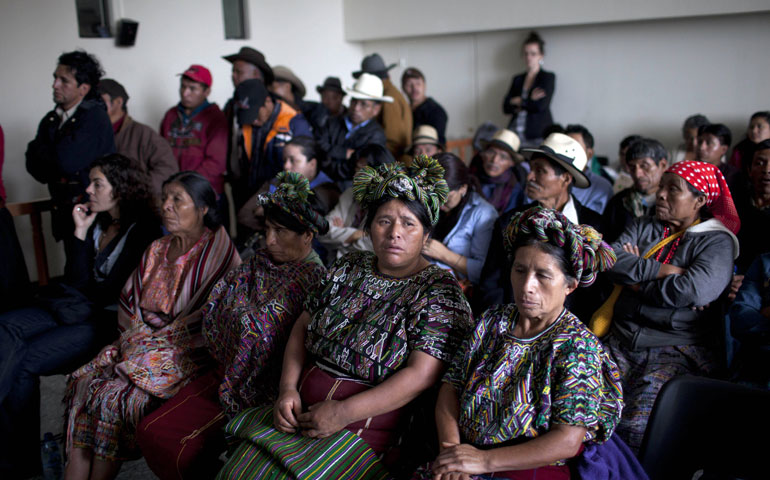
A group of indigenous Ixil women listen during the trial against Gen. Efraín Ríos Montt in Guatemala City Jan 31. (EFE/Saul Martinez)
For the first time in history a former head of state, Guatemala's Gen. Efraín Ríos Montt, is on trial for genocide in the country where the crime occurred. Two hundred thousand died over 36 years of armed conflict in the Central American nation, mostly Maya indigenous noncombatants at government hands. The unfolding judicial process has global repercussions, strengthening possibilities for prosecution of other prominent human rights cases. Next door in El Salvador, no ranking officer has been charged with war crimes, not even those known to have given the orders to kill six Jesuit priests, their housekeeper and her daughter in 1989.
After a CIA coup overthrew Guatemala's democratically elected president, Jacobo Arbenz, in 1954, years of military rule included Ríos Montt's dictatorship from March 1982 to August 1983. It was a particularly frenzied epoch of bloodletting. The army, by its own accounting, annihilated entire villages, lest residents support left-leaning guerrillas.
Even as the army remained untouchable, family members of the dead and disappeared gathered evidence and testimony, holding faith that someday they might see justice, recover the remains of loved ones or know their fates. Carefully exhumed remains from sites across the country now number in the thousands, many positively identified after painstaking work.
In February, before a courtroom including grim-faced survivors, some in traditional, brightly woven Maya dress, a judge accepted some 900 elements of evidence, including every death certificate and expert witness proposed by government prosecutors, despite virulent objections from the defense. Ríos Montt, hale-looking at age 86, wearing a dark blue suit and with a full head of salt-and-pepper hair, wrote notes on a white pad, appearing not at all a defeated man. Indeed, a guilty verdict on the genocide charge is far from assured.
Some Guatemalans believe what the army has long averred, that it saved the country from falling into rebel hands. Many do not care about the recent past; most of the population was born after the regime, and schools barely mention the war. Still others see through an arguably skewed glass. In 1982 in Guatemala City, U.S. President Ronald Reagan met with the fiercely anticommunist Ríos Montt, characterizing him as "a man of great personal integrity" who was getting "a bum rap."
"There is celebration globally about the Ríos Montt trial, which is advancing issues in law and human rights," said Amy Ross, a University of Georgia geography professor who has written widely on international rights trials. She calls the Guatemala proceedings "uncharted waters."
Risks to witnesses and dangers to the court system are greater when holding a war crimes trial in the country where the violence occurred, instead of at an international tribunal. Nevertheless, the anticipated months of argument, testimony and public airing of evidence may help to reinforce Guatemala's own judicial system, long weakened by an overweening military, corruption and the assassination of judges. Attorney General Claudia Paz y Paz, with diminutive stature and youthful appearance, does not look like any country's top cop, but for three years she has indefatigably pursued organized crime, drug lords, and now one of the most fearsome dictators in the history of the region.
Corroboration of mass killing may be plentiful, but to win its case the government must prove the very specific charge of genocide, defined as the intent to destroy, in whole or in part, a group of people based on its nationality, ethnicity, race or religion. The Historical Clarification Commission, created during the peace process that led to signed accords in 1996, found deliberate "acts of genocide" in counterinsurgency operations. Prosecuting attorney Orlando López has said documentation shows Ríos Montt called the Ixil Maya, one of 22 Guatemalan Maya groups, "the internal enemy." López said in court that 33 percent of Ixil Maya died in the killing. The government is citing massacres of Ixiles in highlands where guerrillas maintained a presence. Ríos Montt denies he ordered mass killings.
The Ríos Montt trial resonates with human rights processes worldwide by its example -- the power of a model, a precedent -- and also for its pioneer strategies drawing on international collaboration. In 2006, the Center for Justice and Accountability, a small nonprofit law firm in San Francisco, created a legal team to build a case against Guatemalan war criminals. Attempts to bring perpetrators to justice inside Guatemala were unsuccessful. With a partner rights organization in Madrid, the center filed a case against the general and other military figures in the National Court of Spain. The Spanish court had taken up pleadings, such as against Chile's late Gen. Augusto Pinochet, based on the principle of "universal jurisdiction," which holds some crimes against humanity are so egregious they can be prosecuted anywhere. The center brought more than 40 Guatemala survivors to the ongoing Spanish process, prepared expert witness testimonies, and accumulated other evidence. All of it is now available to prosecutors in the Guatemala Ríos Montt trial.
Oral arguments in the Ríos Montt trial are to begin March 19.
Like a wave hitting a beach, news of the general in the docket is breaking upon El Salvador next door, where no ranking officer has been held to account for the 1980s civil war deaths of 70,000 persons, most of them noncombatants. "Here we don't have such experience," said an editorial in El Salvador's prize-winning digital newspaper El Faro. Every attempt to expose Salvadoran war crimes has met with obstruction, the editorial said in some admiration of the process in Guatemala.
In 2008, the Center for Justice and Accountability brought a case against officers charged with ordering the 1989 assassination at Central American University in San Salvador of six Jesuit priests, their housekeeper and her daughter by soldiers of a U.S.-trained elite brigade. Investigators found two of the officers were working in the United States, one for the Transportation Security Administration. The other, Inocente Orlando Montano, has been convicted of lying on immigration documents. After March 15, a judge will decide to what extent the alleged war crimes will be brought to bear when he sentences Montano.
It is not clear whether the synergy created by national and international collaborations, popular pressure and the growing cascade of global human rights trials may pressure the Salvadoran government to bring the country's own history into the courtroom. The Center for Justice and Accountability and its collaborators accumulate testimony and evidence for the Spanish trial, ready for use in El Salvador if and when that moment comes.
"There have to be trials," said a former centrist Salvadoran congress member who has served as a diplomat abroad. "People remain divided because we don't have the truth about the war, so we have no reconciliation. Some say trials would open wounds, but the wounds have never closed."
[Mary Jo McConahay is the author of Maya Roads: One Woman's Journey Among the People of the Rainforest. She covered the wars in El Salvador and Guatemala for several publications.]



